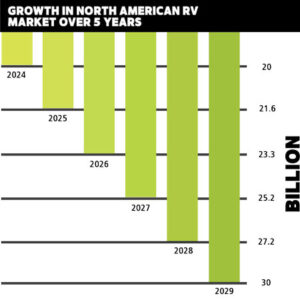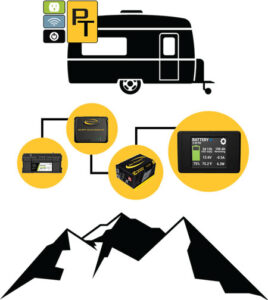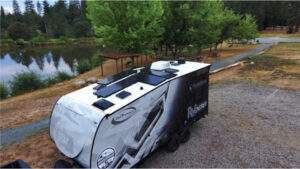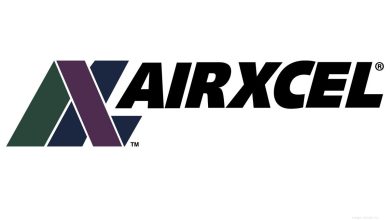Smart RV Technology for Off-Grid Mobile Power Systems
What to look for when offering customers smart RV technology.

RVs have transformed from simple vehicles into advanced, mobile living spaces. Travelers are no longer satisfied with basic facilities. Life on the road has to include a maximum of conveniences and amenities that we are used to at home. When away from shore power, solar is often the best option to supply the energy needed for the modern RV lifestyle. Based on an study from the RV Industry Association (RVIA), 46% of RVers looking to upgrade their vehicle indicate the need for electrical or solar parts.

Another trend is the integration of smart technology in RVs. With the backdrop of smart home technology’s success, the market for smart RV technology and connected RV power systems, in particular, is set for considerable expansion. Dealers and distributors are presented with an opportunity to capitalize on this trend by aligning their offerings with the technological advancements and evolving preferences of RV buyers. Staying ahead of these trends and understanding the benefits of connected RV technology is key to thriving in a dynamic market.
Aligning With a New, Younger Demographic
Recent trends in the RV market highlight a significant demographic shift. According to the 2024 IDS RV Industry Trends Report, young families with children now represent 34% of RV buyers. This younger, more technologically inclined demographic is redefining industry expectations, prioritizing a blend of mobility, comfort and advanced connectivity. The report depicts Gen Z and millennials with high expectations toward tech for their digital nomad lifestyle and concludes: “Mobile friendly is now mobile mandatory.” In addition, the RVIA study finds that younger RVers are spending more than ever to make enhancements to their vehicles.
Smart RV Tech Is Trending
Mirroring the convenience and functionality of smart home tools, a market that has grown over 30% in the United States since 2020, smart RV technology is already conquering the industry, enabling operators to manage myriad RV functions and appliances through smartphones, tablets or onboard touchscreens. Wi-Fi and Bluetooth capabilities allow for the control and monitoring of a wide array of operations, like tire pressure, adjusting lights, extending awnings, deploying level jacks, etc. RV builders are installing interfaces, sensors and full-fledged smart RV systems in the latest generation of vehicles, e.g., Jayco with its JAYCOMMAND, which facilitates controlling and monitoring RV functions with a smartphone.
Why Connected Power Systems?
Integrating an RV’s power system is a logical next step. Solar setups in RVs traditionally involve a fair amount of complexity: The various components, such as solar panels, batteries, inverters, charge controllers, etc., need to be properly hooked up and set up to work effectively as a coherent system. Smart RV technology is a game changer in that respect, enabling efficient energy management from a unified interface. It offers a level of integration and control that aligns with the smart, connected lifestyle that modern RV enthusiasts seek.
- Comprehensive Performance Monitoring:
- Smart RV systems enable continuous monitoring of all components involved in the solar power setup. This feature allows operators to track energy production and consumption in real time, ensuring optimal operation and improving overall energy efficiency.
- System Alerts & Adjustments:
- Systems provide real-time alerts on system status and health, facilitating timely adjustments. This proactive maintenance helps in preventing breakdowns and enhances the longevity of the solar power system.
- Remote Control of Devices & Appliances:
- With smart RV technology, users can remotely control various devices and appliances, adjusting power consumption based on need. This capability is crucial for managing energy use effectively, especially in solar-powered systems where energy conservation is key.
- Ease of Installation:
- The integrated nature of smart RV systems simplifies the installation process, significantly reducing the complexity and time required to set up solar power solutions. The “all-in-one-box” approach not only streamlines installation but also improves system reliability and reduces the likelihood of service calls.
What You Need to Know About RV-C
 RV-C is a communication standard developed specifically for the RV industry. It ensures that various electronic devices within an RV, such as lighting, air conditioning, entertainment and power systems, can communicate seamlessly. RV-C utilizes a network communications protocol that supports real-time data exchange, enhancing system interoperability and enabling sophisticated monitoring and diagnostic capabilities. The standard is crucial for integrating advanced technologies into RVs, providing scalability and customization options for manufacturers and users alike. It is essential for delivering a cohesive and user-friendly smart RV experience.
RV-C is a communication standard developed specifically for the RV industry. It ensures that various electronic devices within an RV, such as lighting, air conditioning, entertainment and power systems, can communicate seamlessly. RV-C utilizes a network communications protocol that supports real-time data exchange, enhancing system interoperability and enabling sophisticated monitoring and diagnostic capabilities. The standard is crucial for integrating advanced technologies into RVs, providing scalability and customization options for manufacturers and users alike. It is essential for delivering a cohesive and user-friendly smart RV experience.
Criteria for Selecting Smart RV Power Systems
When choosing smart RV systems for solar applications, dealers and OEMs should consider the following:
- Integration & Compatibility:
- Systems should easily integrate with existing RV infrastructure and other smart devices, ensuring seamless operation and user experience. Confirm RV-C compatibility.
- User-Friendliness:
- Choose systems that are intuitive and easy for end-users to understand and operate, making sure they appeal to a broad demographic.
- Reliability & Support:
- Reliable systems backed by comprehensive customer support ensure that any issues can be quickly addressed, maintaining customer satisfaction and trust.
- Scalability:
- Smart RV systems should be scalable and allow for upgrades and integration of new technologies, future-proofing the investment.
Reducing Complexity Via Smart Control
The Go Power! PowerTrak Smart Mobile Power System is a solution that redefines convenience for outdoor enthusiasts. It eliminates the need for multiple controls by integrating all system functions into a single touchscreen display. It uses RV-C to optimize solar battery charging and power system performance, effectively eliminating complex configurations during installation.
The system’s 3-inch touchscreen display serves as a centralized control point. It offers multiple mounting options, allowing for optimal placement within the RV. The integrated smart technology also streamlines troubleshooting, eliminating back-and-forth between compatible devices.
Emerging Trends & Future Directions
 Looking ahead, smart RV technology is set to incorporate more advanced features, such as artificial intelligence and Internet of Things (IoT) connectivity. These technologies could further revolutionize solar power management in RVs, offering more precise energy tracking, automated system adjustments and even predictive maintenance capabilities.
Looking ahead, smart RV technology is set to incorporate more advanced features, such as artificial intelligence and Internet of Things (IoT) connectivity. These technologies could further revolutionize solar power management in RVs, offering more precise energy tracking, automated system adjustments and even predictive maintenance capabilities.
By adopting smart RV power systems, dealers and OEMs can meet the current demands of consumers young and old, and position themselves as leaders in a rapidly advancing market. Or as Frank Tamburrini, general manager of IDS, puts it, “The future of RV dealerships isn’t about choosing between technology and human touch — it’s about harnessing the strengths of both.”



